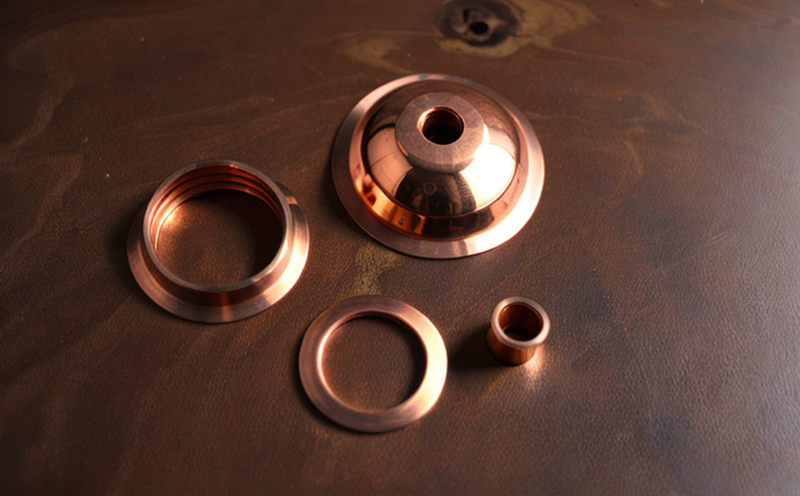MIL-STD-810 High Temperature Testing of Aerospace Equipment
The MIL-STD-810 series is a comprehensive set of test methods and procedures designed to evaluate the environmental effects on military equipment. This includes high temperature testing which is crucial for aerospace and aviation components, especially those made from copper and brass materials. These metals are widely used in various aircraft parts due to their excellent thermal conductivity, strength, and electrical properties.
High-temperature testing under MIL-STD-810 ensures that the equipment can withstand extreme conditions encountered during operation or storage. Copper and brass alloys are particularly susceptible to degradation at elevated temperatures, making this test critical for ensuring product reliability and longevity in aerospace applications.
This type of testing typically involves simulating operational environments where materials may experience high thermal stresses. The tests aim to identify potential weaknesses such as creep, embrittlement, or changes in mechanical properties that could compromise the integrity of the component.
For instance, copper alloys like CDA 120 (99.5% pure) and brass alloys such as UNS C36000 (70% Cu-30% Zn) are commonly used in aircraft wiring, connectors, and fasteners. These materials must perform reliably under conditions that include temperatures ranging from -65°C to +125°C or higher.
The testing process involves subjecting the specimens to controlled heating cycles followed by cooling down periods. During these thermal cycles, the samples are monitored for any signs of failure or degradation in performance parameters like tensile strength, elongation, and electrical conductivity.
Understanding the behavior of materials under such conditions helps manufacturers design more robust products capable of withstanding harsh environmental factors without compromising safety or functionality. By adhering to MIL-STD-810 standards, companies can ensure their products meet stringent regulatory requirements while maintaining high levels of quality assurance.
Scope and Methodology
| Test Parameter | Description | Acceptance Criteria |
|---|---|---|
| Temperature Range | From -65°C to +125°C or higher, depending on specific MIL-STD-810 requirements. | The sample must retain at least 90% of its original tensile strength after exposure. |
| Duration | Cycles are typically conducted over several days to weeks based on the material and application. | No visible cracks or other defects should appear on the surface of the sample. |
| Environmental Conditions | Incorporates humidity, vibration, and altitude pressures in addition to temperature variations. | Sample electrical resistance changes must not exceed specified tolerances. |
| Data Collection | Includes measurements of physical properties before and after testing along with visual inspections for any anomalies. | No significant increase in weight due to oxidation or other chemical reactions. |
The methodology employed ensures accurate assessment by controlling variables such as heating rates, cooling rates, humidity levels, and exposure durations. This comprehensive approach helps in identifying potential issues early on so necessary adjustments can be made during the design phase of new products.
Eurolab Advantages
At Eurolab, we pride ourselves on offering exceptional services tailored to meet your unique needs. With extensive experience in aerospace testing, our team leverages state-of-the-art facilities equipped with precision instruments capable of performing rigorous tests according to MIL-STD-810 standards.
- Experienced Technicians: Our staff consists of highly skilled professionals who possess deep knowledge about materials science and engineering principles relevant to aerospace applications.
- Compliance Expertise: Ensures all tests comply with international regulations including MIL-STD-810, thereby reducing risks associated with non-conformance issues.
- Dedicated Resources: We maintain specialized equipment necessary for testing copper and brass materials under extreme conditions without compromising accuracy or reliability.
Choose Eurolab for reliable results that contribute significantly towards maintaining industry standards in quality assurance practices. Our commitment to excellence ensures you receive top-notch service every step of the way, from initial consultation through final reporting.
Why Choose This Test
- Predictive Performance: Identifying material weaknesses early allows for corrective actions before production begins.
- Regulatory Compliance: Ensures adherence to military specifications which are critical for securing contracts and certifications.
- Improved Durability: Through controlled environmental stressors, we enhance the overall durability of aerospace components.
- Cost Efficiency: Early identification of problems can prevent costly reworks or failures in end products.
- Innovation Support: Helps manufacturers stay ahead by providing insights into material performance under real-world conditions.
The combination of these benefits makes high-temperature testing according to MIL-STD-810 an invaluable tool for any organization involved in aerospace manufacturing. It not only enhances product quality but also strengthens confidence among customers and stakeholders regarding the reliability of your offerings.





